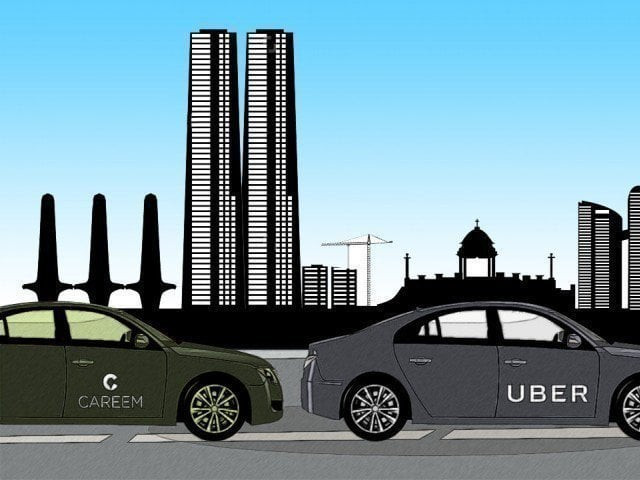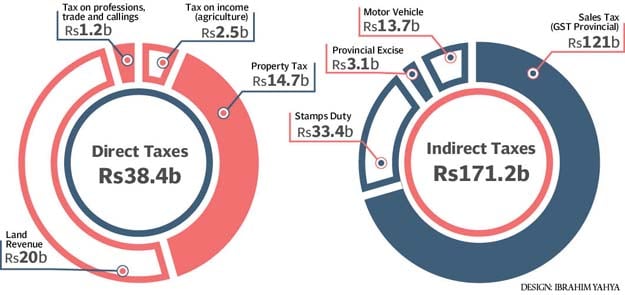Punjab brings ride-hailing apps under sales tax net
Such services will pay only 4% tax now compared to 16% previously

Animation of Careem and Uber. PHOTO: EXPRESS
Previously, the ride-hailing apps were giving tax under the rent-a-car services category and were paying 16% tax, however, now they will have to pay only 4% tax under the Punjab Sales Tax on Services Act 2012.
The total number of services under the tax net in Punjab has now increased to 69.
Other than ride-hailing apps, no new tax has been imposed in the next fiscal year by the Punjab government. Instead, the provincial economic managers have slashed tax rates on more than 20 services due to the ongoing Covid-19 pandemic.
The tax rate on many services has been reduced from 16% to 5% and in some cases to zero per cent for the next fiscal year. Interestingly, the province claimed that these measures would not only help to boost economic activities but would also help jack up the revenue stream of Punjab.
The province’s biggest source of income is the federal divisible pool. For the ongoing fiscal year, the original estimate for federal fund transfers was Rs1,601 billion, which was revised to Rs1,127.9 billion later. In the next fiscal year, Punjab is expected to receive Rs1,432.99 billion from Islamabad.
It simultaneously expects to generate Rs220.886 billion through provincial taxes and Rs96.18 billion in non-tax revenues for fiscal year 2020-21.

For the current fiscal year, provincial taxes are likely to remain around Rs191.1 billion against the original estimate of Rs294.96 billion. In non-tax revenues, the income is likely to remain around Rs89 billion against the original estimate of Rs93.395 billion.
Total general revenue receipts are estimated at Rs1,750.035 billion for the next fiscal year against the revised estimate of Rs1,408.398 billion for 2019-20.
The revenue target for the Punjab Revenue Authority has been set at Rs125 billion for 2020-21 against the Rs166-billion original and Rs105-billion revised estimate for 2019-20.
The provincial Board of Revenue is expected to collect Rs56 billion; Excise, Taxation and Narcotics Control Department Rs32.36 billion, Energy Department Rs6.847 billion and Transport Department Rs0.675 billion in the next fiscal year.
Bakht, in his budget speech, said for 2020-21, Punjab intended to give a tax relief package of Rs56 billion. A special tax discount of 5% has been proposed for using the e-payment method and electronic invoicing initiatives have been extended to maximum number of services.
“Tax rates have been reduced for restaurants/beauty parlours on transactions conducted through debit/credit card,” the Finance Bill stated, adding, “This initiative will help in documentation of the economy, else the person has to pay tax rate of 16%.”
It stated, “The rates have also been reduced for the sectors hit by the pandemic such as hotels, caterers, marriage halls/lawns, catering and allied services, IT, tour operators, gyms, property dealers, rent-a-car, cable TV operators, treatment of textile and leather services, commission agents of agri-produce, auditing, accounting and tax consultancy services, photography and parking services.”
In order to promote the use of information technology and empower technology-based entrepreneurship, the tax rate for this sector has been reduced from 16% to 5%.
The Finance Bill stated that the overall objective of reducing the tax rates was to ease hardships of businesses by reducing the rates on a number of service sectors. The idea is to increase voluntary compliance without resorting to coercive measures.
The Finance Bill stated that despite grave monetary challenges to the government exchequer in revenue collection, a sufficient relief through reduction in stamp duty under the Stamp Act was given to the general public due to Covid-19 in the last quarter of fiscal year 2019-20, which is being extended to 2020-21.
On excise and taxation, the Finance Bill 2020 proposed a discount of 10% in property tax for maintenance to align taxes with market rates. The rate of entertainment duty on cinemas has been proposed to be slashed to 5% from 20% for the revival of the sinking industry.
Similarly, relief in payment of property tax and motor vehicle tax under the Punjab Urban Immovable Property Tax Act, 1958 and the Punjab Motor Vehicles Taxation Act 1958 has been proposed by extending the rebate periods.
The Finance Bill stated that these steps will helpful in increasing the government revenue and create fiscal space. In the current situation of Covid-19, some measures have been proposed to create ease for tax payers.
Published in The Express Tribune, June 16th, 2020.
Like Business on Facebook, follow @TribuneBiz on Twitter to stay informed and join in the conversation.



















COMMENTS
Comments are moderated and generally will be posted if they are on-topic and not abusive.
For more information, please see our Comments FAQ